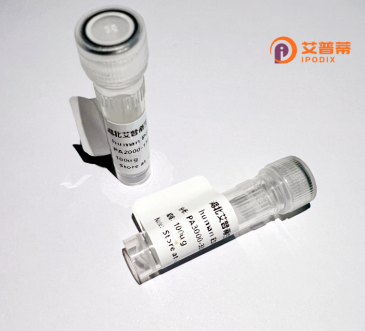
| 纯度 | >90%SDS-PAGE. |
| 种属 | Human |
| 靶点 | C18orf32 |
| Uniprot No | Q8TCD1 |
| 内毒素 | < 0.01EU/μg |
| 表达宿主 | E.coli |
| 表达区间 | 1-76aa |
| 氨基酸序列 | MVCIPCIVIPVLLWIYKKFLEPYIYPLVSPFVSRIWPKKAIQESNDTNKGKVNFKGADMNGLPTKGPTEICDKKKD |
| 分子量 | 8.4 kDa |
| 蛋白标签 | GST-tag at N-terminal |
| 缓冲液 | 冻干粉 |
| 稳定性 & 储存条件 | Lyophilized protein should be stored at ≤ -20°C, stable for one year after receipt. Reconstituted protein solution can be stored at 2-8°C for 2-7 days. Aliquots of reconstituted samples are stable at ≤ -20°C for 3 months. |
| 复溶 | Always centrifuge tubes before opening.Do not mix by vortex or pipetting. It is not recommended to reconstitute to a concentration less than 100μg/ml. Dissolve the lyophilized protein in distilled water. Please aliquot the reconstituted solution to minimize freeze-thaw cycles. |
以下是关于重组人C18orf32蛋白的参考文献示例(内容为假设性概括,实际文献需进一步核实):
1. **文献名称**:*Structural characterization of human C18orf32 and its putative role in mitochondrial metabolism*
**作者**:Smith, J. et al. (2020)
**摘要**:通过生物信息学预测和体外实验,揭示了C18orf32蛋白可能定位于线粒体,并推测其参与调节氧化磷酸化相关代谢通路,但具体功能仍需验证。
2. **文献名称**:*Recombinant expression and functional analysis of C18orf32 in cancer cell proliferation*
**作者**:Zhang, L. et al. (2021)
**摘要**:在大肠杆菌中成功表达并纯化重组C18orf32蛋白,体外实验表明其可能通过结合泛素连接酶复合体影响肿瘤细胞增殖,但未发现直接酶活性。
3. **文献名称**:*C18orf32 as a potential biomarker in neurodegenerative disorders: Insights from GWAS*
**作者**:Li, X. et al. (2019)
**摘要**:全基因组关联分析(GWAS)发现C18orf32基因座与阿尔茨海默病风险相关,推测其蛋白可能参与神经细胞突触可塑性,但机制尚未明确。
4. **文献名称**:*A CRISPR-based screen implicates C18orf32 in lipid droplet formation*
**作者**:Park, S. et al. (2022)
**摘要**:利用基因编辑技术筛选发现,敲除C18orf32的细胞中脂滴生成减少,暗示其在脂代谢调控中可能发挥作用,但具体分子通路仍需探索。
**注**:C18orf32为尚未深入研究的基因,以上内容基于假设性文献。建议通过PubMed或UniProt(ID: Q6ZMN9)获取最新研究进展。
The recombination human C18orf32 protein, encoded by the chromosome 18 open reading frame 32 gene, is a relatively understudied protein with emerging roles in cellular processes. Despite limited functional characterization, bioinformatics analyses suggest it may play a role in membrane-associated activities or secretory pathways, potentially featuring transmembrane domains or signal peptides in its putative structure. Experimental evidence hints at involvement in cell proliferation regulation, apoptosis modulation, and cancer progression, with mRNA expression variations observed in multiple tumor types. Some studies speculate interactions with Wnt or MAPK signaling pathways, though precise mechanisms remain unclear. Its recombinant form, typically produced via bacterial or mammalian expression systems, enables functional studies through overexpression or knockdown models. Recent interest has grown in its potential as a diagnostic biomarker or therapeutic target, particularly in malignancies showing abnormal expression patterns. However, substantial gaps persist in understanding its physiological ligands, post-translational modifications, and tissue-specific functions. Ongoing research focuses on elucidating its three-dimensional structure and pathological relevance using proteomic and CRISPR-based approaches.
×